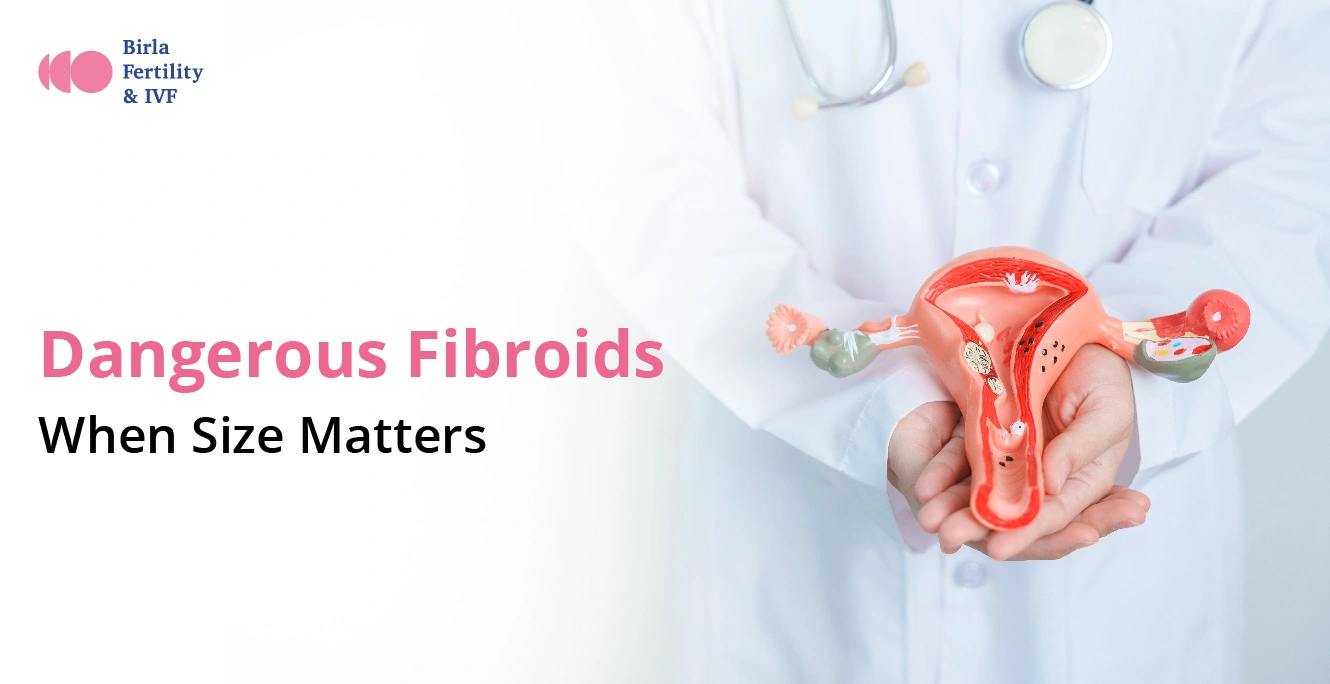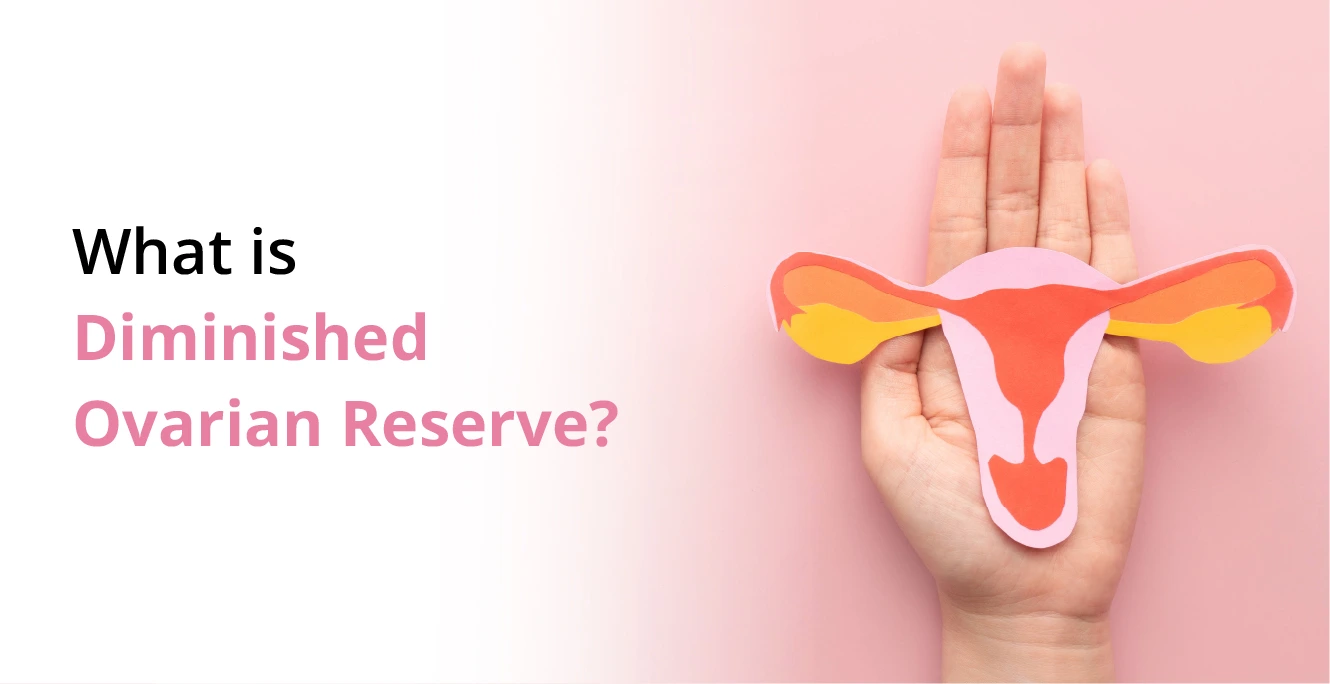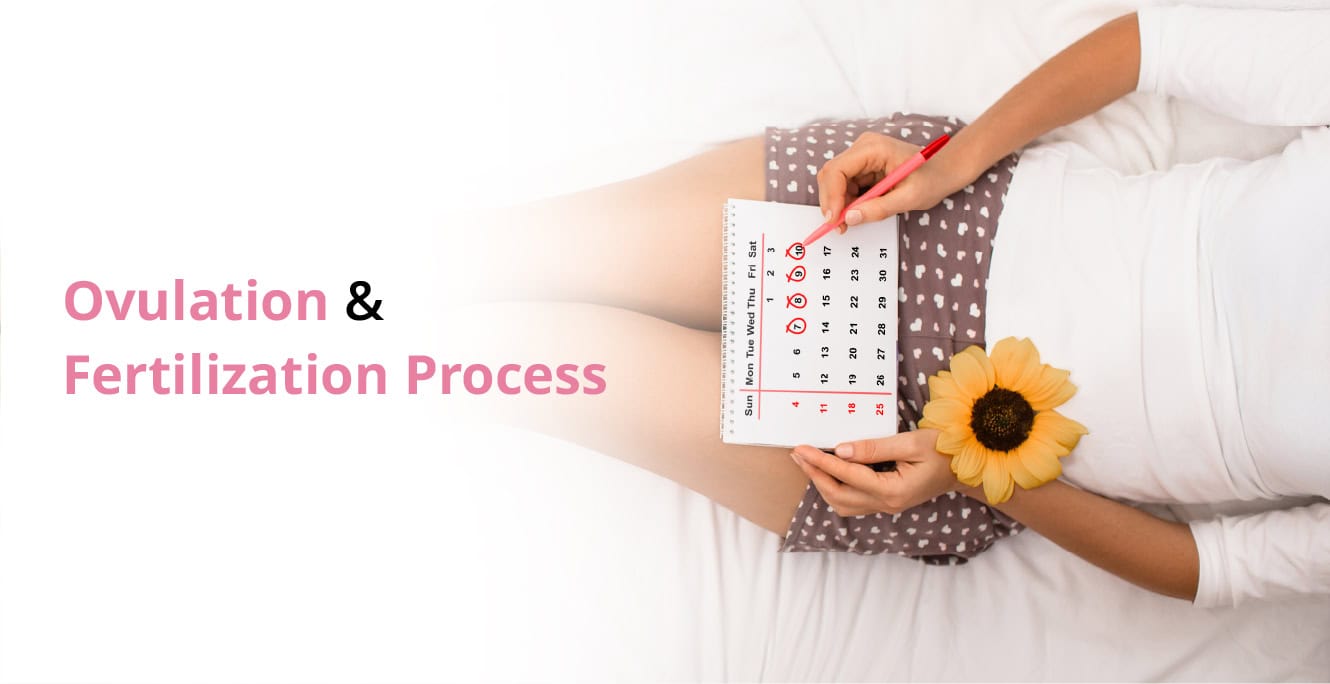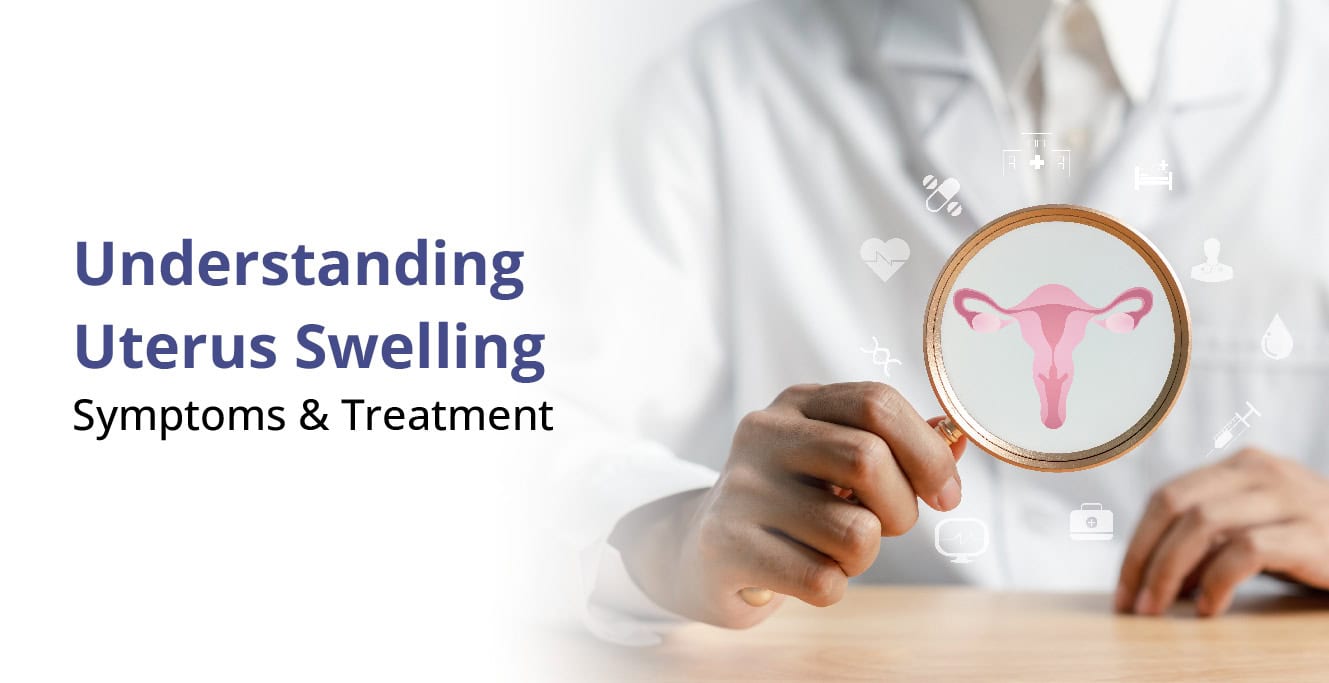
Early Menopause: Causes, Symptoms & Treatment Options

Table of Contents
- At What Age does Menopause Start?
- Causes of Early Menopause
- Symptoms of Premature Menopause
- Menopause Diagnosis
- Treatment Options for Early Menopause
- Risks Associated with Early Menopause
- Relationship Between Early Menopause and Fertility
- Lifestyle Modifications to Ease the Transition
- Difference Between Early Menopause & Premature Menopause
- Can Premature Menopause Be Reversed?
- Bleeding after menopause
- Can you get pregnant post menopause?
- Conclusion
- FAQs :
Menopause is a natural biological process that marks the end of a woman’s reproductive years. It typically occurs between the ages of 45 to 55. However, at times, a lot of women experience symptoms associated with menopause (hot flashes, night sweats, sleep problems, low energy, and joint pain) before the age of 40. This is known as early menopause. There can be various reasons for the same, which can be from a combination of medical, genetic, and lifestyle factors.
As per the National Institute of Health (NIH),
- Early menopause or premature menopause affects 1% of women under the age of 40
- Causes of early menopause may differ; it might be a subtle indication of other developing neuro, psychological, ortho or cardiac comorbidities.
- With the early onset of menopause symptoms, the risk of infertility soars up.
In this article, let’s understand the significant causes of early menopause, its symptoms, and the treatment options to ease this challenging transition.
At What Age does Menopause Start?
Many women wonder at what age menopause starts. As mentioned earlier, the natural menopause woman’s age range is usually between 45 and 55 years. Globally, the average is around 51 years. Early menopause can happen before age 45. On the other hand, premature menopause occurs before the age of 40.
Menstrual cycles come to a stop with menopause, which is verified after 12 months without periods.
Causes of Early Menopause
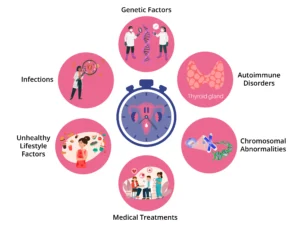
The causes of early menopause may vary from one individual to another, depending on their age and underlying condition. For women, transitioning into this phase can be challenging. Hence, it may lead to significant implications for their overall health and fertility. Some of the common causes of early menopause are:
- Genetic Factors: It is one of the significant causes of early menopause. For example, if a woman’s mother or sibling went through early menopause, there is a higher likelihood that she might get it too.
- Autoimmune Disorders: Conditions such as rheumatoid arthritis and thyroid disease can cause the immune system to attack the ovaries, resulting in early menopause.
- Medical Treatments: Chemotherapy and radiation therapy for cancer can harm the ovaries and cause early menopause. Additionally, surgeries for the ovaries or uterus removal can cause early menopause.
- Chromosomal Abnormalities: Turner syndrome and Fragile X syndrome are genetic disorders that cause premature ovarian failure, leading to early menopause.
- Unhealthy Lifestyle Factors: Smoking, excessive alcohol consumption, and a sedentary lifestyle may accelerate the onset of menopause. High levels of stress and inadequate nutrition are also major causes of early menopause.
- Infections: Certain infections, such as mumps, tuberculosis, and malaria, have been linked to early menopause or premature ovarian failure.
Symptoms of Premature Menopause
Some symptoms of premature menopause can impact the quality of life, causing significant discomfort as well. Some of the common early menopause symptoms are:
| Symptom | Description |
| Irregular Periods | Changes in menstrual cycle patterns, such as irregular or missed periods, are among the early indications of menopause. |
| Hot Flashes and Night Sweats | Sudden sensations of heat, particularly at night, can impair sleep. |
| Mood Changes | Increased irritability, anxiety, or depression are a few early signs of menopause. |
| Vaginal Dryness | Low estrogen levels can cause dryness, discomfort and pain during intercourse. |
| Decreased Libido | Lower sex drive is a common symptom of early menopause. |
| Cognitive Changes | High possibility of developing memory-related problems and having difficulty concentrating. |
| Sudden Bodily Changes | Irregular weight gain, irregular weight loss, thinning hair, and dry skin are also associated with menopause. |
Menopause Diagnosis
The only way to get confirmation is through a formal diagnosis. Before you consult a doctor, try tracking your periods. The uneven pattern will serve as an additional clue for your doctor.
A gynaecologist may recommend tests to determine the levels of:
- Follicle-stimulating hormone (FSH): When you approach menopause, the FSH goes up.
- Estradiol: The level of Estradiol tells how much estrogen is being produced by your ovaries. During menopause, the Estradiol decreases in level.
- Thyroid hormones: Problems with the thyroid gland cause symptoms that mimic menopause.
- Anti-Müllerian Hormone (AMH): This test indicates your ovarian reserve. Lower AMH levels can signal reduced egg supply and help in assessing menopause onset.
The lack of menstruation for 12 consecutive months can further confirm your diagnosis.
Treatment Options for Early Menopause
Here are a few treatment options that can help you manage early menopause:
- Hormone Replacement Therapy (HRT): HRT is commonly used to relieve menopausal symptoms by replenishing estrogen and progesterone levels. Doctors usually prescribe pills, patches, gels, or creams to reduce the symptoms of early menopause.
- Non-Hormonal Medications: Antidepressants and anti-seizure medications are prescribed for symptoms of early menopause and are effective in managing hot flashes and mood swings.
- Vaginal Estrogen: For vaginal dryness and discomfort, doctors recommend low-dose estrogen, which can be applied directly to the vaginal area through creams, tablets, or rings.
- Bone Health Management: To prevent osteoporosis, calcium and vitamin D supplements, along with medications like bisphosphonates, may be recommended.
- Herbal Remedies: Some women find relief with herbal supplements like black cohosh, evening primrose oil, and red clover. However, no research proves it, so it is essential to consult with your doctor before starting any herbal treatment.
Risks Associated with Early Menopause
- Infertility: Early menopause stops ovulation much more easily than normal, which makes natural conception impossible. However, there are assisted fertility treatments that can help.
- Bone Loss: Estrogen is the hormone that protects bone density. When early menopause happens, it leads to faster bone thinning, and there is a higher risk of fractures because of the same.
- Cardiovascular Problems: Estrogen also plays a role in maintaining heart and blood vessel health. Without it, women face higher risks of heart disease, stroke, and hypertension.
- Cognitive Decline: Early menopause leads to hormonal loss that can affect the functioning of the brain. This can lead to memory problems, dementia, or Alzheimer’s later in life.
- Sexual Health Issues: There can be issues related to your vagina. It can face dryness or thinning tissues can cause discomfort. Low libido can result in painful intercourse and more.
- Eye & Oral Health Issues: Lower estrogen is linked to cataracts and dry eye syndrome. Gum disease and tooth loss also become more common.
- Reduced Life Expectancy: There is research that suggests that women with early menopause live shorter lives.
Relationship Between Early Menopause and Fertility
Early menopause, once triggered, can significantly impact fertility as it leads to a decrease in the number and quality of eggs. Women experiencing the onset of early menopause might face challenges in conceiving naturally. However, there are options available:
Early menopause can have a substantial impact on fertility since it reduces the quantity and quality of eggs. Women going through early menopause may struggle to conceive naturally.
However, there are a few treatment options available for assisted reproduction, such as:
- Egg Freezing: Techniques for fertility preservation, such as egg freezing, can be considered if early menopause is diagnosed before a woman is ready to conceive.
- Assisted Reproductive Technologies (ART): Options like in vitro fertilisation (IVF) combined with donor eggs can be an effective treatment method for women with early menopause.
- Surrogacy: Surrogacy and adoption are two viable options for women affected by early menopause.
Lifestyle Modifications to Ease the Transition
Transitioning into menopause can be challenging for most women, including those who enter the phase prematurely. But some simple lifestyle modifications can help you alleviate discomfort, some as them are:
- Healthy Diet: Save your body from depletion of nutrients. Following a healthy diet rich in calcium, vitamin D, and phytoestrogens can help manage this effectively. Food items like leafy greens, dairy products, and soy are beneficial for women affected by early menopause.
- Regular Exercise: Physical activity can not only help maintain a healthy body mass index (BMI), but also help reduce stress and improve mood swings. Additionally, weight-bearing exercises are effective for bone health.
- No Smoking: Smoking cessation can delay the onset of menopause and reduce the symptoms of early menopause.
- Stress Management: Practising yoga, meditation, and deep-breathing exercises can help in alleviating stress and improving overall well-being.
- Adequate Sleep: Establishing a regular sleep routine and creating a comfortable sleep environment can help you manage night sweats and improve your sleep quality.
Difference Between Early Menopause & Premature Menopause
Early Menopause |
Premature Menopause |
| Menopause occurs before its time, between the ages of 40-45. | Menopause occurs before the age of 40. |
| It can be caused because of reasons connected to family medical history or genetics. There are certain medical treatments as well that can cause early menopause, such as surgery, chemotherapy, and radiation. | It can be caused due to several reasons, including genetic or chromosomal abnormalities, autoimmune diseases, and some cancer treatments that affect the ovaries. |
| The symptoms are similar to natural menopause, including hot flashes, mood changes, vaginal dryness, and irregular periods. There are other health risks involved as well, like reduced bone density (also known as osteoporosis) and loss of estrogen, resulting in a higher risk of heart disease. | The symptoms are more sudden and severe, as estrogen drops at a very young age. Some women may even notice signs of early menopause in their 20s, such as irregular cycles or hot flashes, which indicate POI. |
Can Premature Menopause Be Reversed?
There is no way to reverse premature menopause that happens before the age of 40. It is because the ovaries quit working way earlier than anticipated. This results in infertility and decreased estrogen production.
There are treatments available that help control the symptoms and enhance the quality of life. Here are some of the popular options:
- Hormone Replacement Therapy (HRT) – Helps balance the hormones, relieve symptoms like hot flashes, and reduce the risk of heart disease.
- Calcium & Vitamin D supplements- Support bone health and help prevent osteoporosis.
- Non-Hormonal Mediation- Certain antidepressants can help reduce hot flashes and mood swings in women.
- Vaginal Estrogen- Available as creams, rings, or tablets to relieve vaginal dryness, discomfort, and urinary symptoms.
Today, there are various fertility therapies like IVF that can offer hope for women who wish to conceive despite premature menopause. Apart from medical treatment, positive changes in lifestyle, such as stress reduction, regular exercise, and a balanced diet, also help promote general well-being. Even though premature menopause cannot be reversed, prompt medical attention helps women adjust to this transition, both physically and mentally. It it completely natural to feel a mix of emotions, like frustration, sadness, or anxiety, during this time. But, acknowleding these feelings is important as well. With the right care and support, women can manage the symptoms and regain a sense of empowerment during this transition.
Bleeding after menopause
Some women experience bleeding after menopause, and it can be a sign of a more serious health issue. Postmenopausal bleeding occurs after a year since the last period. It can be a symptom of uterine cancer, polyps (noncancerous growth), or vaginal dryness. Bleeding after menopause requires medical attention and suitable treatment.
Can you get pregnant post menopause?
Even though you ovaries stop releasing eggs after menopause, it doesn’t mean that you dream of becoming a mother is over. We understand that you reproductive system might not work the same way, but there are assisted reproductive treatments that can make parenthood possible.
One option is a donor egg combined with IVF (In Vitro Fertilisation). In this option a donor’s eggs are fertilised with your partner’s sperm in the lab, and the result, as in the embryo is placed in your uterus. It is one of the popular ways that has helped many women become parents post menopause.
There is one more possibility. Nowadays, many women are freezing their eggs earlier in life. In this process, the eggs are frozen and when required it can be tawed and used for IVF. There can be a few complications, but doctors keep a close eye throughout the journey to help you with the same. They key is to talk to a fertility specialist and know all your options. They can guide you with advice that’s right for you and your parenthood journey.
Conclusion
Early menopause is a significant gynecological condition that can bring a challenging transition. Experiencing it can be confusing and overwhelming, as it affects hormone levels, fertility, and overall well-being. Understanding the causes, symptoms, and treatments can help women manage this phase more effectively.
To combat symptoms of early menopause, adopting a healthy lifestyle, seeking appropriate medical treatments, and staying informed can be very helpful. Medical interventions like HRT (Hormone Replacement Therapy) can make a huge difference. They can help you take the first step in taking control and managing this transition with confidence. Medical interventions like HRT (Hormone Replacement Therapy) can make a huge difference. So, what are you waiting for? Connect with our specialists to know more!
FAQs :
What happens during menopause?
It is a time when your body stops producing estrogen and progesterone. This can leave you feeling fatigued, moody, and experiencing hot flashes.
What are the three stages of menopause?
Women undergo three stages of menopause: perimenopause, menopause, and postmenopause.
What are the first signs of menopause?
The first signs of menopause include sore breasts, trouble sleeping, vaginal dryness, missed or irregular periods, and mood changes.
Our Fertility Specialists
Related Blogs
To know more
Birla Fertility & IVF aims at transforming the future of fertility globally, through outstanding clinical outcomes, research, innovation and compassionate care.
Had an IVF Failure?
Talk to our fertility experts

 Our Centers
Our Centers Select City
Select City 










